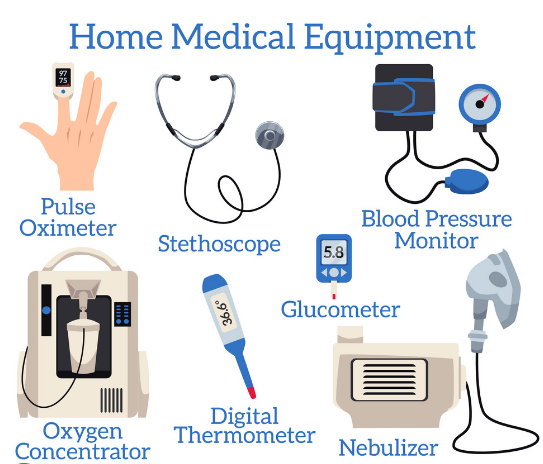Monitoring
In today’s world, health monitoring has never been more critical. With the rise of chronic illnesses and the increasing need for immediate healthcare interventions, having reliable medical equipment at home is not just a convenience—it’s a necessity. Among the most important devices that every household should consider are the blood pressure monitor and the pulse oximeter (SpO2 machine). These tools are essential for maintaining health, especially for individuals with conditions like hypertension, heart disease, respiratory issues, and those recovering from illness.

Blood Pressure Monitor: A Lifesaver in Your Hands
High blood pressure, often termed the “silent killer,” is a condition that can go unnoticed for years, quietly damaging your body. Regular monitoring of blood pressure at home is a proactive way to manage this condition. Here’s why a blood pressure monitor is indispensable:
- Early Detection: Regular readings can help detect abnormal patterns, allowing for early intervention before serious complications arise.
- Management: For those already diagnosed with hypertension, frequent monitoring helps manage the condition by ensuring medications and lifestyle changes are effective.
- Convenience: Home blood pressure monitors make it easy to check your readings without the need for frequent visits to a healthcare provider, saving time and reducing stress.
Pulse Oximeter: Keeping an Eye on Your Oxygen Levels
A pulse oximeter, or SpO2 machine, is another vital tool, particularly in light of respiratory conditions and the recent pandemic. This device measures the oxygen saturation in your blood—a critical indicator of respiratory health. Here’s why having a pulse oximeter at home is essential:
- Respiratory Health Monitoring: It’s particularly useful for individuals with asthma, COPD, or other chronic lung diseases, providing real-time data on oxygen levels.
- Early Warning: Sudden drops in oxygen saturation can signal a respiratory problem that needs immediate medical attention, potentially saving lives.
- COVID-19 Management: During the pandemic, pulse oximeters became a household staple, helping individuals monitor their oxygen levels and seek timely medical care if necessary.
The Role of Medical Equipment in Home Care
For elderly patients, those with chronic conditions, or anyone recovering from an illness, having these medical devices at home enhances their ability to monitor their health independently. This autonomy not only boosts confidence but also provides peace of mind to both patients and their families.
Furthermore, in a home visit scenario, having access to accurate, up-to-date information from these devices allows visiting doctors to make informed decisions quickly, potentially altering the course of treatment for better outcomes.
Conclusion: Equip Your Home for Better Health
Investing in a blood pressure monitor and a pulse oximeter is a small step that can have a significant impact on your health. These tools empower you to take control of your well-being, providing valuable insights that can guide your healthcare decisions. At [Your Company Name], we strongly encourage our patients to consider adding these essential devices to their home health toolkit, ensuring they are well-prepared to manage their health effectively.
Remember, your health is your most valuable asset—equip yourself with the tools to protect it.


